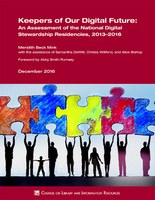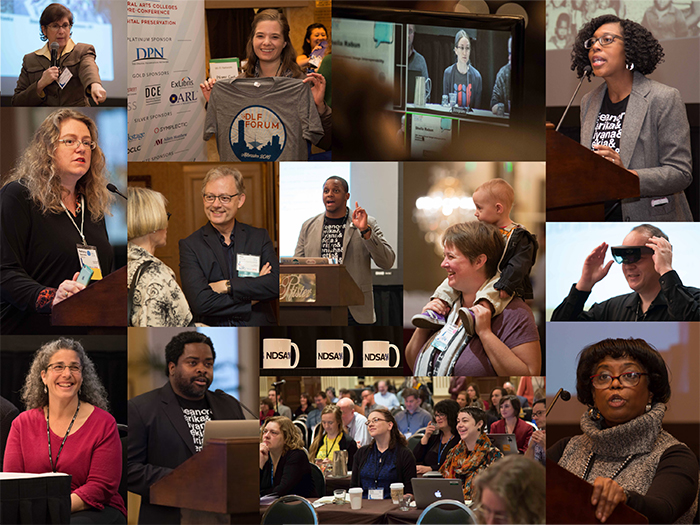
Number 114 • November/December 2016
ISSN 1944-7639 (online version)
Contents
Report Examines Early Impacts of the National Digital Stewardship Residency Programs
CLIR Welcoms New Board Members, Appoints New Officers
CLIR and Axiell to Partner on Digital Library of the Middle East
2016 Forum: Reaffirming Core Values
Deadlines Approaching: Postdoctoral Fellowships, Leading Change, Rovelstad Scholarship
Welcome New Staff!
CLIR Issues is produced in electronic format only. To receive the newsletter electronically, please sign up at https://www.clir.org/pubs/issues/signup. Content is not copyrighted and can be freely distributed.
Report Examines Early Impacts of National Digital Stewardship Residency Program
A new report from CLIR examines the early impacts of the National Digital Stewardship Residency (NDSR) programs and the potential for their expansion nationally. The residencies place graduates of master’s programs in information science and related fields at cultural heritage organizations to pursue projects related to the collection, selection, management, preservation, and accessibility of digital material.
 Keepers of Our Digital Future: An Assessment of the National Digital Stewardship Residencies, 2013–2016 provides a formative evaluation of the early residencies, based on surveys and interviews with NDSR participants and supervisors from the Washington D.C., New York, and Boston programs. The study was led by Meridith Beck Mink, with the assistance of Samantha DeWitt, Christa Williford, and Alice Bishop.
Keepers of Our Digital Future: An Assessment of the National Digital Stewardship Residencies, 2013–2016 provides a formative evaluation of the early residencies, based on surveys and interviews with NDSR participants and supervisors from the Washington D.C., New York, and Boston programs. The study was led by Meridith Beck Mink, with the assistance of Samantha DeWitt, Christa Williford, and Alice Bishop.
Over the past two decades, the significant increase in born-digital material and concern over the loss of digital and analog content have driven the demand for information professionals with a host of new skills. “The NDSR was created to address this need for effective management of digital materials by increasing the number of professionals prepared to undertake that vital work,” writes Mink.
“The need to rethink the work of stewardship … for the digital age is clear and it is urgent,” writes Abby Smith Rumsey in her foreword to the report. Because cultural heritage institutions have always adhered to principles of openness while also protecting the privacy of their users, she notes, “they enjoy a measure of trust unmatched by commercial entities… These cultural values will grow more important.”
The NDSR programs were designed to establish a set of norms and practices that could be followed by similar initiatives nationwide. The report describes the NDSR model and examines the similarities and differences among the Washington, D.C., Boston, and New York programs. The authors present their major findings and recommendations for administering the programs, developing a curriculum and skills, and strengthening cohorts and mentorship.
Among the key findings is that, as the model is reproduced nationwide, there is greater need for national-level coordination and communication across programs. The authors offer a series of recommendations for stakeholders in the NDSR programs who wish to pursue a nationally coordinated effort.
The report is available as a PDF download free of charge at https://www.clir.org/pubs/reports/pub173.
CLIR Welcomes New Board Members, Appoints New Officers
CLIR is pleased to announce the appointment of four new Board members, elected at the Board’s November meeting: Jill Cousins, of Europeana; Buhle Mbambo-Thata, of the University of South Africa; Carol Mandel, of New York University; and John Price Wilkin, of the University of Illinois at Urbana-Champaign.
 Jill Cousins is executive director of Europeana, the European Union’s digital platform for cultural heritage. She has many years of experience in web publishing, which she is applying to the library and cultural heritage arenas. She has worked in commercial publishing as European business development director of VNU New Media, and with Blackwell Publishing, running their online journal service. Ms. Cousins will also serve on the DLF advisory committee.
Jill Cousins is executive director of Europeana, the European Union’s digital platform for cultural heritage. She has many years of experience in web publishing, which she is applying to the library and cultural heritage arenas. She has worked in commercial publishing as European business development director of VNU New Media, and with Blackwell Publishing, running their online journal service. Ms. Cousins will also serve on the DLF advisory committee.
 Carol Mandel is dean of the New York University Division of Libraries, which includes NYU’s libraries in New York, Abu Dhabi, and Shanghai; along with Campus Media Services, University Archives, and the NYU Press. Her work has focused on the transformation of infrastructures, services, and partnerships to serve the research library’s core mission in a digital environment. Her publications and presentations have also explored changing modes of research and teaching, preservation of digital content, new models in scholarly communication, and access to primary resources. Most recently, she has focused on infrastructure and service design to provide seamless services to students and faculty throughout NYU’s global system.
Carol Mandel is dean of the New York University Division of Libraries, which includes NYU’s libraries in New York, Abu Dhabi, and Shanghai; along with Campus Media Services, University Archives, and the NYU Press. Her work has focused on the transformation of infrastructures, services, and partnerships to serve the research library’s core mission in a digital environment. Her publications and presentations have also explored changing modes of research and teaching, preservation of digital content, new models in scholarly communication, and access to primary resources. Most recently, she has focused on infrastructure and service design to provide seamless services to students and faculty throughout NYU’s global system.
 Buhle Mbambo-Thata is executive director of library services at the University of South Africa (UNISA). Several major strategic projects have been implemented during her tenure, including the UNISA Institutional Repository; implementation of the Mobile Devise Catalogue Access (AIRPAC)—the first of its kind on the continent; extended library hours; and the implementation of Radio Frequency Technology to enable self-services for clients. In addition to her role at UNISA, she is active in the International Federation of Library Associations and Institutions (IFLA), where she is a member of the governing board, and she is a member of the Strategic Advisors Network of the Global Libraries Program of the Bill and Melinda Gates Foundation. Ms. Mbambo-Thata will also serve on the DLF advisory committee.
Buhle Mbambo-Thata is executive director of library services at the University of South Africa (UNISA). Several major strategic projects have been implemented during her tenure, including the UNISA Institutional Repository; implementation of the Mobile Devise Catalogue Access (AIRPAC)—the first of its kind on the continent; extended library hours; and the implementation of Radio Frequency Technology to enable self-services for clients. In addition to her role at UNISA, she is active in the International Federation of Library Associations and Institutions (IFLA), where she is a member of the governing board, and she is a member of the Strategic Advisors Network of the Global Libraries Program of the Bill and Melinda Gates Foundation. Ms. Mbambo-Thata will also serve on the DLF advisory committee.
 John Price Wilkin is dean of libraries and university librarian at the University of Illinois at Urbana-Champaign. Before his appointment in 2013, he was executive director of HathiTrust and associate university librarian for publishing and technology at the University of Michigan. He has published and presented widely on digital collection building and intellectual rights. He serves on the Digital Preservation Network (DPN) Executive Committee, the Advisory Board for the Berkeley Law Digital Library Copyright Project, the HathiTrust Executive Committee, and the HathiTrust Board of Governors.
John Price Wilkin is dean of libraries and university librarian at the University of Illinois at Urbana-Champaign. Before his appointment in 2013, he was executive director of HathiTrust and associate university librarian for publishing and technology at the University of Michigan. He has published and presented widely on digital collection building and intellectual rights. He serves on the Digital Preservation Network (DPN) Executive Committee, the Advisory Board for the Berkeley Law Digital Library Copyright Project, the HathiTrust Executive Committee, and the HathiTrust Board of Governors.
The Board also elected new officers, as follows: Chair—Kathleen Fitzpatrick (MLA); Vice-Chair—Max Marmor (Samuel H. Kress Foundation); and Treasurer—Winston Tabb (Johns Hopkins University Libraries).
CLIR and Axiell to Partner on Digital Library of the Middle East
CLIR and Axiell announced this week that they will partner to explore collaborative opportunities to design and sustain the <ahref=”https://www.clir.org/initiatives-partnerships/DLME”>Digital Library of the Middle East (DLME). Based in Lund, Sweden, <ahref=”http://www.axiell.com/”>Axiell is a leading vendor globally of collections management software to archives, libraries, and museums.
“This partnership marks a new direction for CLIR; we are excited and eager to work together,” said CLIR President Charles Henry. “Axiell’s long experience in the Middle East, its knowledge in service to preserving cultural heritage, and innovative technology solutions for collection management and education make it a compelling collaborator. At heart, Axiell’s mission is to facilitate a humanistic enrichment of our capacity for understanding our world and our astonishingly rich cultural heritage, consonant with the vision of CLIR and the DLME.”
As presently conceived, the DLME will combine digital inventories with high-resolution digital replicas of cultural artifacts originating from the Middle East, including artifacts managed by cultural organizations in the region as well as digitized items relevant to Middle Eastern cultural heritage maintained around the world. In addition, large-scale digitization and cataloging of museum, library, and archival physical objects—as well as artifacts from archeological sites—will be supported throughout the Middle East to enrich the scope of cultural materials online. Images and descriptions from the DLME will be made publicly available, to the extent permitted by copyright, to encourage greater understanding of the region’s cultural legacy.
The project aims to be sustainable and to provide a cultural commonwealth, while helping safeguard a fundamentally important expression of our humanity. Making the inventory available and creating a teaching resource would further open it up for advanced research in the region. Through its high-resolution images and detailed descriptions of ownership and legal status, this multimedia digital library will be designed to trace the provenance and track the movement of historically significant items as a means to inhibit looting and illicit trafficking.
Axiell has ongoing contracts with cultural institutions in Bahrain, Egypt, Jordan, Kuwait, Oman Qatar, Saudi Arabia and the United Arab Emirates, comprising a significant part of the broader region that the partners working on the DLME aspire to cover. These would form a solid basis for the inventory alongside Axiell’s other worldwide customers with artifacts from the region.
Commenting on the collaboration, Axiell Group President & CEO Joel Sommerfeldt said, “Axiell is proud and honored to be invited to collaborate with the Council on Library and Information Resources. Our organizations have a common view of how important it is to preserve and share the world’s history, to the benefit of research and cross-cultural collaboration. We are glad to be able to contribute with our knowledge of how to manage data, enrich collections and make them more accessible in a digital age. In our collaboration with CLIR, we will help support and guide in the development of the Digital Library of the Middle East.“
2016 Forum: Reaffirming Core Values
This year’s DLF Forum and affiliated events, held November 6–10 in Milwaukee, will be remembered for record-breaking attendance (700 people over five days); for a reaffirmed commitment to social justice; and for taking place the week of a divisive national election.
“For the Digital Library Federation, November 10th saw the close of a joyful and self-consciously more <ahref=”https://www.diglib.org/page_id=11814/”>inclusive 2016 <ahref=”https://www.diglib.org/dlf-events/2016forum/”>DLF Forum, characterized by deeper critical introspection, the clarion leadership of our <ahref=”https://www.diglib.org/dlf-events/2016forum/keynotes/”>keynote speakers, broad sharing of best practices and the fruits of community-spirited labor, and increasing resolve to support our collective <ahref=”https://www.diglib.org/about/”>mission to advance research, learning, social justice, and the public good through the creative design and wise application of digital library technologies,” <ahref=”https://www.diglib.org/page_id=13044/”>writes DLF Director Bethany Nowviskie. “It also saw the close of a bitterly contentious and divisive national presidential election …” She addressed the community on November 10th with an “<ahref=”https://www.diglib.org/page_id=12979/”>Open Invitation” to use the Digital Library Federation as a counter-platform, and a reaffirmation of the DLF’s longstanding commitment to diversity, inclusion, equity, and social justice. DLF has subsequently published an <ahref=”https://wiki.diglib.org/Main_Page”>Organizers’ Toolkit and welcomes community input and use.
Livestream recordings of several sessions, including keynotes and closing remarks for the <ahref=”https://www.diglib.org/dlf-events/2016forum/dlflac/”>DLF Liberal Arts College Preconference, Forum, and NDSA’s <ahref=”http://ndsa.org/meetings/”>Digital Preservation 2016 are available at <ahref=”https://www.diglib.org/dlf-events/2016forum/livestream-schedule/”>https://www.diglib.org/dlf-events/2016forum/livestream-schedule/.
Several Forum Fellows have posted their reflections at <ahref=”https://www.diglib.org/news/”>https://www.diglib.org/news/. The collage below features a few photo highlights. Additional photos are available <ahref=”https://www.flickr.com/photos/117379017@N06/sets/72157673234424164″>here.
The 2017 Forum will be held in Pittsburgh October 23–25.

Deadlines Approaching: Postdoctoral Fellowships, Leading Change Institute, Rovelstad Scholarship
Don’t miss the December 30 deadline for CLIR’s Fellowships in Academic Libraries and CLIR/DLF Fellowships in Data Curation for Latin Ameican and Caribbean Studies! <ahref=”https://www.clir.org/fellowships/postdoc/applicants/acad”>Nine fellowships in academic libraries are being offered—including our first in Asia, at the Chinese University in Hong Kong. <ahref=”https://www.clir.org/fellowships/postdoc/applicants/fellowships-in-data-curation-for-latin-american-and-caribbean-studies”>Five fellowships in data curation for Latin American and Caribbean Studies are available.
Apply by January 13 for the 2017 <ahref=”http://www.leadingchangeinstitute.org/”>Leading Change Institute. Learn more about this year’s program at <ahref=”http://www.leadingchangeinstitute.org/what-is-the-program”>http://www.leadingchangeinstitute.org/what-is-the-program.
January 27, 2017 is the deadline to apply for the <ahref=”https://www.clir.org/fellowships/rovelstad”>Rovelstad Scholarship in International Librarianship. The scholarship supports a student of library and information science to attend the World Library and Information Congress of the International Federation of Library Associations and Institutions (IFLA). The 2017 IFLA annual meeting will be held in Wroclaw, Poland, August 19–25.
Welcome New Staff!
 We are delighted to welcome Pedro Gonzalez-Fernandez as our newest staff member and program associate for CLIR’s <ahref=”https://www.clir.org/recordings-at-risk”>Recordings at Risk program. He will serve as the main contact for program applicants and grantees. Mr. Gonzalez-Fernandez comes to us from the University of Maryland Special Collections, where he was project archivist. He has both an MLS, with concentration in curation and preservation of digital assets, and a master’s in Music History and Literature.
We are delighted to welcome Pedro Gonzalez-Fernandez as our newest staff member and program associate for CLIR’s <ahref=”https://www.clir.org/recordings-at-risk”>Recordings at Risk program. He will serve as the main contact for program applicants and grantees. Mr. Gonzalez-Fernandez comes to us from the University of Maryland Special Collections, where he was project archivist. He has both an MLS, with concentration in curation and preservation of digital assets, and a master’s in Music History and Literature.

